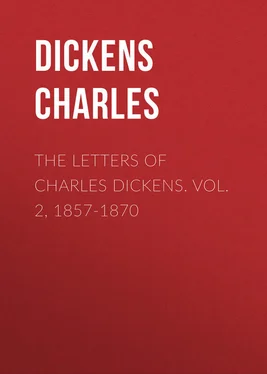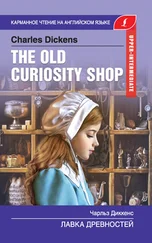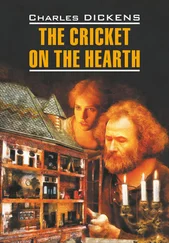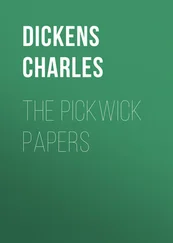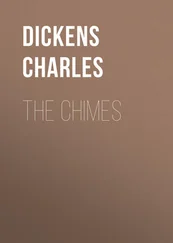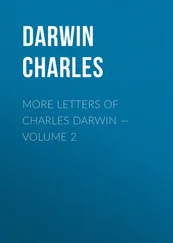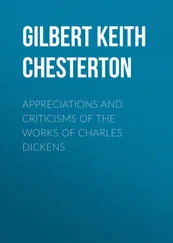Чарльз Диккенс - The Letters of Charles Dickens. Vol. 2, 1857-1870
Здесь есть возможность читать онлайн «Чарльз Диккенс - The Letters of Charles Dickens. Vol. 2, 1857-1870» — ознакомительный отрывок электронной книги совершенно бесплатно, а после прочтения отрывка купить полную версию. В некоторых случаях можно слушать аудио, скачать через торрент в формате fb2 и присутствует краткое содержание. Жанр: foreign_antique, foreign_prose, на английском языке. Описание произведения, (предисловие) а так же отзывы посетителей доступны на портале библиотеки ЛибКат.
- Название:The Letters of Charles Dickens. Vol. 2, 1857-1870
- Автор:
- Жанр:
- Год:неизвестен
- ISBN:нет данных
- Рейтинг книги:3 / 5. Голосов: 1
-
Избранное:Добавить в избранное
- Отзывы:
-
Ваша оценка:
- 60
- 1
- 2
- 3
- 4
- 5
The Letters of Charles Dickens. Vol. 2, 1857-1870: краткое содержание, описание и аннотация
Предлагаем к чтению аннотацию, описание, краткое содержание или предисловие (зависит от того, что написал сам автор книги «The Letters of Charles Dickens. Vol. 2, 1857-1870»). Если вы не нашли необходимую информацию о книге — напишите в комментариях, мы постараемся отыскать её.
The Letters of Charles Dickens. Vol. 2, 1857-1870 — читать онлайн ознакомительный отрывок
Ниже представлен текст книги, разбитый по страницам. Система сохранения места последней прочитанной страницы, позволяет с удобством читать онлайн бесплатно книгу «The Letters of Charles Dickens. Vol. 2, 1857-1870», без необходимости каждый раз заново искать на чём Вы остановились. Поставьте закладку, и сможете в любой момент перейти на страницу, на которой закончили чтение.
Интервал:
Закладка:
We shall not get to Cork before mid-day on Monday; it being difficult to get from here on a Sunday. We hope to be able to start away to-morrow morning to see the Giant's Causeway (some sixteen miles off), and in that case we shall sleep at Dublin to-morrow night, leaving here by the train at half-past three in the afternoon. Dublin, you must understand, is on the way to Cork. This is a fine place, surrounded by lofty hills. The streets are very wide, and the place is very prosperous. The whole ride from Dublin here is through a very picturesque and various country; and the amazing thing is, that it is all particularly neat and orderly, and that the houses (outside at all events) are all brightly whitewashed and remarkably clean. I want to climb one of the neighbouring hills before this morning's "Dombey." I am now waiting for Arthur, who has gone to the bank to remit his last accumulation of treasure to London.
Our men are rather indignant with the Irish crowds, because in the struggle they don't sell books, and because, in the pressure, they can't force a way into the room afterwards to sell them. They are deeply interested in the success, however, and are as zealous and ardent as possible. I shall write to Katie next. Give her my best love, and kiss the darling Plorn for me, and give my love to all the boys.
Ever, my dearest Mamie, Your most affectionate Father.I am so delighted to find your letter here to-night (eleven o'clock), and so afraid that, in the wear and tear of this strange life, I have written to Gad's Hill in the wrong order, and have not written to you, as I should, that I resolve to write this before going to bed. You will find it a wretchedly stupid letter; but you may imagine, my dearest girl, that I am tired.
The success at Belfast has been equal to the success here. Enormous! We turned away half the town. I think them a better audience, on the whole, than Dublin; and the personal affection there was something overwhelming. I wish you and the dear girls could have seen the people look at me in the street; or heard them ask me, as I hurried to the hotel after reading last night, to "do me the honour to shake hands, Misther Dickens, and God bless you, sir; not ounly for the light you've been to me this night, but for the light you've been in mee house, sir (and God love your face), this many a year." Every night, by-the-bye, since I have been in Ireland, the ladies have beguiled John out of the bouquet from my coat. And yesterday morning, as I had showered the leaves from my geranium in reading "Little Dombey," they mounted the platform, after I was gone, and picked them all up as keepsakes!
I have never seen men go in to cry so undisguisedly as they did at that reading yesterday afternoon. They made no attempt whatever to hide it, and certainly cried more than the women. As to the "Boots" at night, and "Mrs. Gamp" too, it was just one roar with me and them; for they made me laugh so that sometimes I could not compose my face to go on.
You must not let the new idea of poor dear Landor efface the former image of the fine old man. I wouldn't blot him out, in his tender gallantry, as he sat upon that bed at Forster's that night, for a million of wild mistakes at eighty years of age.
I hope to be at Tavistock House before five o'clock next Saturday morning, and to lie in bed half the day, and come home by the 10.50 on Sunday.
Tell the girls that Arthur and I have each ordered at Belfast a trim, sparkling, slap-up Irish jaunting-car!!! I flatter myself we shall astonish the Kentish people. It is the oddest carriage in the world, and you are always falling off. But it is gay and bright in the highest degree. Wonderfully Neapolitan.
What with a sixteen mile ride before we left Belfast, and a sea-beach walk, and a two o'clock dinner, and a seven hours' railway ride since, I am – as we say here – "a thrifle weary." But I really am in wonderful force, considering the work. For which I am, as I ought to be, very thankful.
Arthur was exceedingly unwell last night – could not cheer up at all. He was so very unwell that he left the hall(!) and became invisible after my five minutes' rest. I found him at the hotel in a jacket and slippers, and with a hot bath just ready. He was in the last stage of prostration. The local agent was with me, and proposed that he (the wretched Arthur) should go to his office and balance the accounts then and there. He went, in the jacket and slippers, and came back in twenty minutes, perfectly well , in consequence of the admirable balance. He is now sitting opposite to me on the bag of silver, forty pounds (it must be dreadfully hard), writing to Boulogne.
I suppose it is clear that the next letter I write is Katie's. Either from Cork or from Limerick, it shall report further. At Limerick I read in the theatre, there being no other place.
Best love to Mamie and Katie, and dear Plorn, and all the boys left when this comes to Gad's Hill; also to my dear good Anne, and her little woman.
Ever affectionately.My dear Wilkie,
First, let me report myself here for something less than eight-and-forty hours. I come last (and direct – a pretty hard journey) from Limerick. The success in Ireland has been immense.
The work is very hard, sometimes overpowering; but I am none the worse for it, and arrived here quite fresh.
Secondly, will you let me recommend the enclosed letter from Wigan, as the groundwork of a capital article, in your way, for H. W.? There is not the least objection to a plain reference to him, or to Phelps, to whom the same thing happened a year or two ago, near Islington, in the case of a clever and capital little daughter of his. I think it a capital opportunity for a discourse on gentility, with a glance at those other schools which advertise that the "sons of gentlemen only" are admitted, and a just recognition of the greater liberality of our public schools. There are tradesmen's sons at Eton, and Charles Kean was at Eton, and Macready (also an actor's son) was at Rugby. Some such title as "Scholastic Flunkeydom," or anything infinitely contemptuous, would help out the meaning. Surely such a schoolmaster must swallow all the silver forks that the pupils are expected to take when they come, and are not expected to take away with them when they go. And of course he could not exist, unless he had flunkey customers by the dozen.
Secondly – no, this is thirdly now – about the Christmas number. I have arranged so to stop my readings, as to be available for it on the 15th of November , which will leave me time to write a good article, if I clear my way to one. Do you see your way to our making a Christmas number of this idea that I am going very briefly to hint? Some disappointed person, man or woman, prematurely disgusted with the world, for some reason or no reason (the person should be young, I think) retires to an old lonely house, or an old lonely mill, or anything you like, with one attendant, resolved to shut out the world, and hold no communion with it. The one attendant sees the absurdity of the idea, pretends to humour it, but really thus to slaughter it. Everything that happens, everybody that comes near, every breath of human interest that floats into the old place from the village, or the heath, or the four cross-roads near which it stands, and from which belated travellers stray into it, shows beyond mistake that you can't shut out the world; that you are in it, to be of it; that you get into a false position the moment you try to sever yourself from it; and that you must mingle with it, and make the best of it, and make the best of yourself into the bargain.
Читать дальшеИнтервал:
Закладка:
Похожие книги на «The Letters of Charles Dickens. Vol. 2, 1857-1870»
Представляем Вашему вниманию похожие книги на «The Letters of Charles Dickens. Vol. 2, 1857-1870» списком для выбора. Мы отобрали схожую по названию и смыслу литературу в надежде предоставить читателям больше вариантов отыскать новые, интересные, ещё непрочитанные произведения.
Обсуждение, отзывы о книге «The Letters of Charles Dickens. Vol. 2, 1857-1870» и просто собственные мнения читателей. Оставьте ваши комментарии, напишите, что Вы думаете о произведении, его смысле или главных героях. Укажите что конкретно понравилось, а что нет, и почему Вы так считаете.
